December 19, 2022 Antoinette Richardson
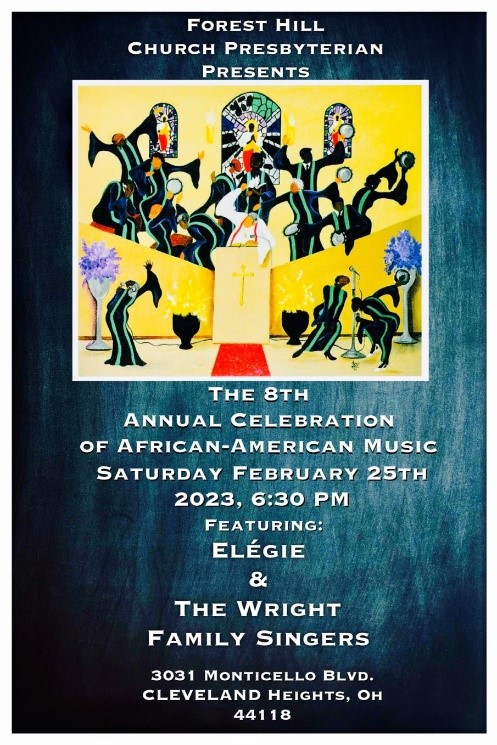
The Black History Education Committee announces a return of programming for the full month of February.
Watch for more information in the New Year!
And Save the Date for the Black History Concert on Saturday, February 25, 2023.
August 30, 2022 Antoinette Richardson
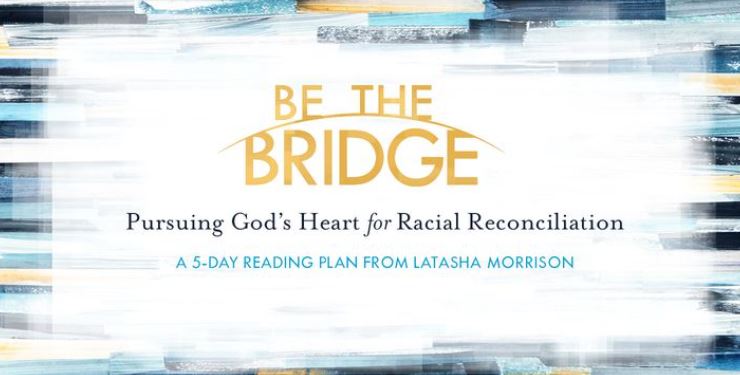
Exploring Racial Equity Buddies
The racial equity buddies concept was introduced to Forest Hill Church (“FHC”) about four years ago, by a frequent visitor and friend of FHC, Professor Mark Joseph*. Saturday morning, September 17, via ZOOM (10:30 to noon), Mark will lead us as we meet to continue this program. Those wishing to attend can respond to racialequitybuddies@fhcpresb.org or register here: https://fhc.breezechms.com/form/0a3ab6.
The Racial Equity Buddy Program Explained
I. A buddy is a trusted companion where difficult discussions on race can be had. To be successful, this must be a safe space where two people can be honest and explore their equity journey:
a) On the personal level of combatting racism, to better explore racial stereotypes and barriers that separate us, Dr. Joseph recommends partnering with someone of a different background, culture, or race. Our partner should be a person with whom we feel comfortable having a candid and frank discussion on these issues.
b) The partners should talk openly and honestly, without judgment, about one another’s experiences and views regarding race and racism. The key is to listen to each other and examine the world from your partner’s viewpoint. This shared experience, if faithfully done, should bring about greater understanding and appreciation of each other’s views and perhaps, result in a change in how each thinks and acts.
c) One’s racial equity buddy can be someone from the same race. In FHC, that is necessary due to the asymmetrical ratio of black and white members.
d) A racial equity buddy is NOT a personal trainer for his or her partner. Rather, where the buddies are of different races or cultures, the conversations should reflect the individual views of the participants. No black person should attempt to speak for or to represent all people of color and no white person should presume to speak for or to represent all white people.
e) Buddies are not assigned but choose to partner with each other. Help is available in making a match. Having multiple buddies is okay and changing buddies after a while is normal and beneficial.
II. The racial equity buddy concept is a method for enlarging and changing individual awareness and perspectives, which hopefully will lead to transforming those institutions they are a part of:
a) Our premise is that in our racialized society, we all urgently need to be on a personal journey to remove the injustice and inequity in the organizations and institutions that we have inherited, that we depend upon, that we support. That requires each of us to look with improved vision at our role and responsibility in perpetuating or deconstructing the racial injustice and inequity that is still embedded in the inherited organizations and institutions on which our way of life depends. Our goal is to get the members and participating friends of FHC on this journey and to begin it with a trusted buddy with a different background and perspective;
b) It must be appreciated that each individual is at a different point in their racial equity journey. We must be cognizant and appreciative that some of us are just beginning and are not as far along as others in this journey. However, if there is a willingness to begin such a journey, those individuals are welcome. With such a buddy, one must be even more sensitive to the principles that discussions are to be a safe place and nonjudgmental. Some of us will be walking and others running. One needs to learn about his/her buddy and act accordingly.
Other important aspects of the racial equity buddies include consistency, an open and curious mind plus a willingness to engage in respectful dialogue. Embarking on a racial equity journey requires a willingness to explore the history of non-white cultures in America. Be prepared to embark on a wonderful, colorful discovery tour and learn about hidden historical figures and events.
The impetus for resuscitating this program was Deborah Plummer’s book Some Of My Friends Are… The Daunting Challenges and Untapped Benefits of Cross-Racial Friendships, which we read and discussed in June. That book reminded us of the importance of cross-racial friendships and discussions and motivated many – both in and outside of FHC – to reimplement the racial equity buddy program.
As implied, the book club works in tandem with the racial equity buddies. Reading and discussing the material of the book club will fuel your racial equity work. The book club introduces various topics and explores non-white culture in a safe, non-judgemental atmosphere.
Our first book discussion takes place Saturday morning, October 25, where we will discuss the NY times bestseller and winner of the Christian Book Award, Be The Bridge, Pursuing God’s Heart For Racial Reconciliation, by Latasha Morrison. The book club adheres to the core principles of the equity buddies program outlined above.
PRAYING FOR CHANGE?
We must do more than pray. In the words of Fannie Lou Hamer,
“You can pray until you faint, but unless you get up and try to do something, God is not going to put it in your lap” Join us. Together we will pray and act!
*For those of you unfamiliar with Mark Joseph, here is a brief introduction. Mark Joseph, Ph.D. is the Leona Bevis/Marguerite Haynam Professor of Community Development at the Jack, Joseph, and Morton Mandel School of Applied Social Sciences at Case Western Reserve University. His research focus is mixed-income development as a strategy for promoting urban equity and inclusion. He is the co-author of the award-winning book Integrating the Inner City: The Promise and Perils of Mixed-Income Public Housing Transformation and co-editor of What Works to Promote Inclusive, Equitable Mixed-Income Communities. He is the Founding Director of the National Initiative on Mixed-Income Communities, which conducts research and consulting projects in cities across the US and Canada. He serves on the Editorial Advisory Boards of the journals Cityscape, Housing Policy Debate, Journal of Community Practice, and Journal of Race and Ethnicity in the City. He received his undergraduate degree from Harvard University, a Master’s and Ph.D. from the University of Chicago, was a Post-Doctoral Scholar at the University of Chicago, and a Harlech Scholar at Oxford University.
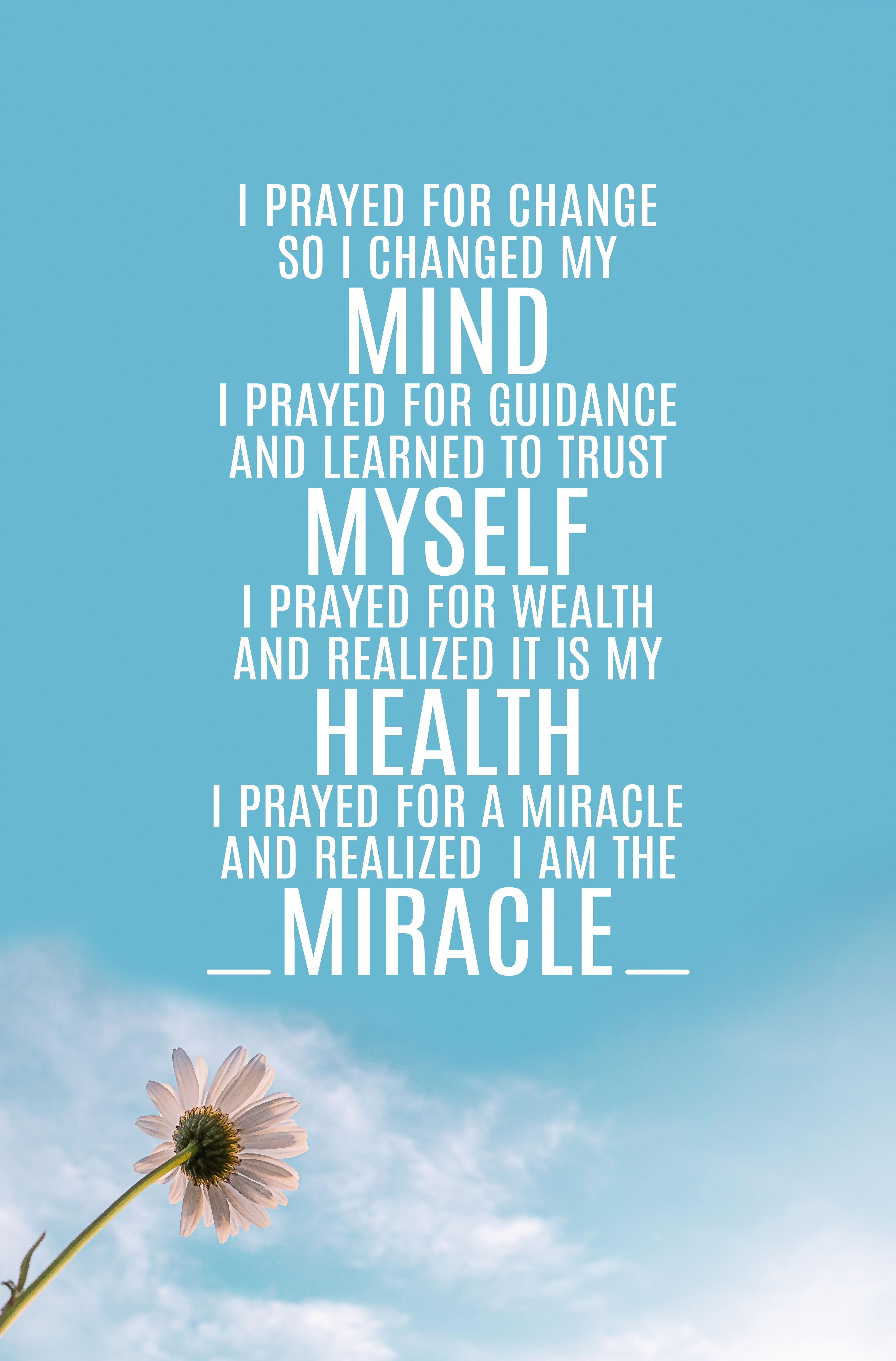
May 19, 2022 Elizabeth Shaw
Our final book discussion before we break for summer will take place (via Zoom) Saturday morning, June 18 from 10:30 to 12 noon. We will be discussing Professor Deborah Plummer’s book “Some of My Friends Are…The Daunting Challenges and Untapped Benefits of Cross-Racial Friendships“. Why do neighborhoods tend to be primarily of one race? Why do both Whites and Blacks generally only have superficial friendships with one another? This book delves into these questions. Deborah L. Plummer, Ph.D., is a psychologist, author, university professor and speaker on topics central to racial equality, inclusion, and mutual respect. She is most passionate about creating inclusive organizations and building peaceful communities.
Send an email to BlackCaucus@FHCPresb.com to register.
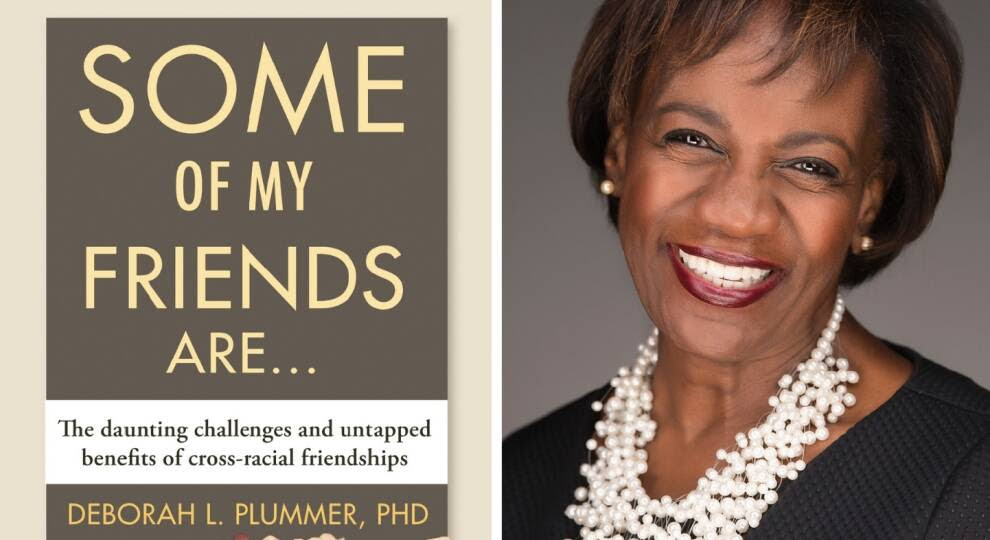
April 4, 2022 Elizabeth Shaw
In The Whiteness of Wealth, author Dorothy A. Brown draws on decades of cross-disciplinary research to show that tax law isn’t as color-blind as she’d once believed. She takes us into her adopted city of Atlanta, introducing us to families across the economic spectrum whose stories demonstrate how American tax law rewards the preferences and practices of white people while pushing black people further behind. From attending college to getting married to buying a home, black Americans find themselves at a financial disadvantage compared to their white peers. The results are an ever-increasing wealth gap and more black families shut out of the American dream.
To participate in this Zoom discussion, send an email to the Black Caucus at: blackcaucus@fhcpresb.org or register here: https://fhc.breezechms.com/form/7b1894314.
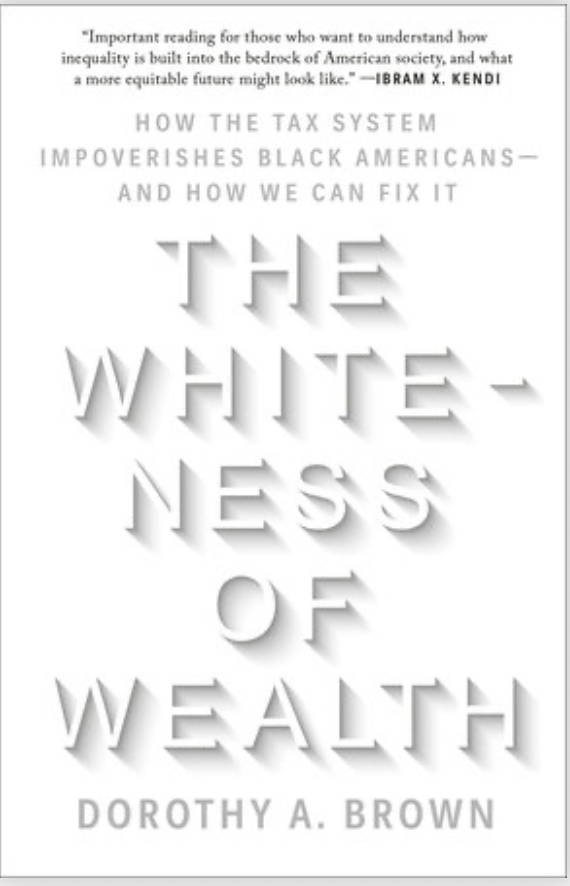
February 1, 2022 Elizabeth Shaw
The Black Caucus Book Club will host a discussion of “How The Word Is Passed” by Clint Smith on Saturday March 5, 2022, 10:30 AM – 12:00 Noon. To receive the Zoom link, please email: BlackCaucus@FHCPresb.org
A deeply researched and transporting exploration of the legacy of slavery and its imprint on centuries of American history, How the Word Is Passed illustrates how some of our country’s most essential stories are hidden in plain view—whether in places we might drive by on our way to work, holidays such as Juneteenth, or entire neighborhoods like downtown Manhattan, where the brutal history of the trade in enslaved men, women, and children has been deeply imprinted.
Informed by scholarship and brought to life by the story of people living today, Smith’s debut work of nonfiction is a landmark of reflection and insight that offers a new understanding of the hopeful role that memory and history can play in making sense of our country and how it has come to be.
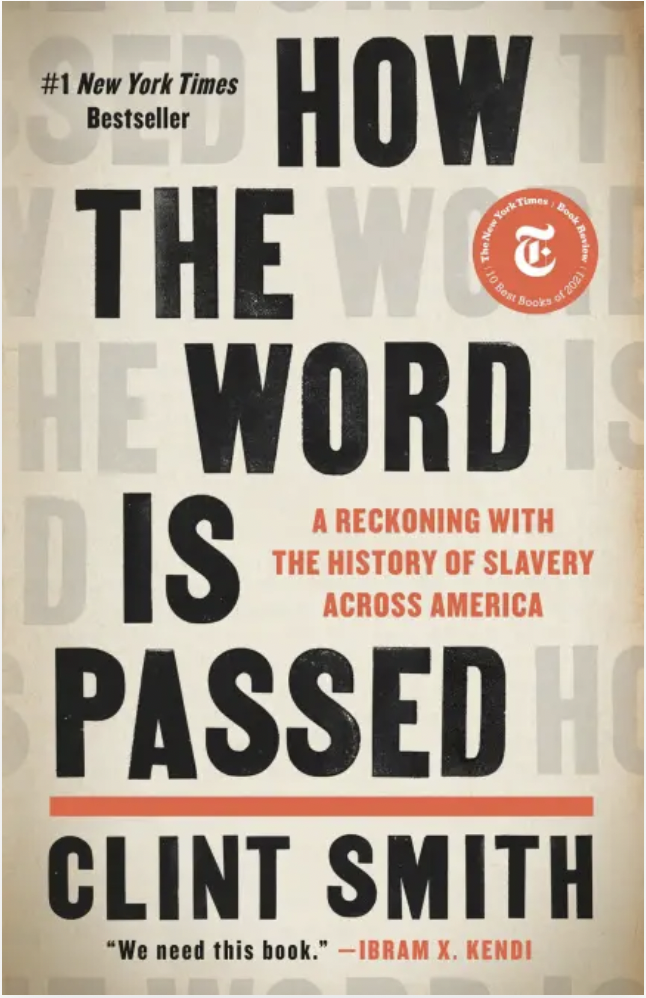
September 16, 2021 Elizabeth Shaw
Join the Black Caucus (via zoom) Saturday Morning, October 23 from 10:30 a.m to noon, October 23 to discuss “White Rage” by Carol Andersen. This is an important and insightful book on race and racism. To receive the ZOOM link contact us at blackcaucus@fhcpresb.org. All people of goodwill are welcome.
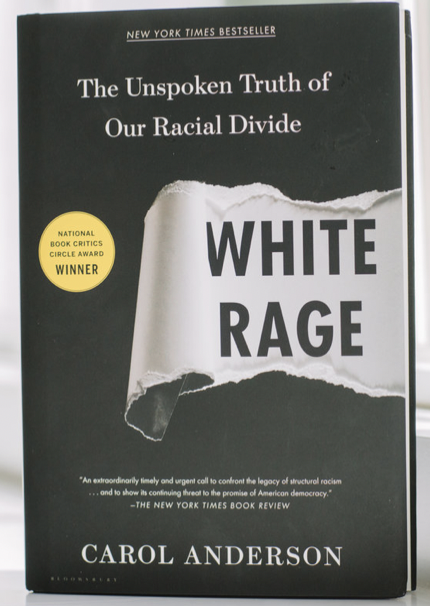
March 24, 2021 Me and White Supremacy Book Club
Back in July 2020, in the thick of the pandemic, book clubs from Forest Hill Church (FHC) started meeting, via Zoom, to read and discuss Me and White Supremacy by Layla Saad. The Presbytery of the Western Reserve, catalyzed by the Race Action Network, worked with leaders in our own congregation including Ajah Hales, Marcie Denton and Mark Wedell. They chose Saad’s text as a community-wide read, created helpful guides and a Facebook page with additional content to support the work, and three Forest Hill groups were up and running quickly.
One group, consisting of 6 white women, scheduled their original meetings as outlined by the book. As this small group’s facilitator, Lisa Vahey describes it “Me and White Supremacy is organized into four ‘weeks’ of learning, each with a theme and seven lessons. Every single day — 28 of them — brings knowledge about white supremacy. Each day asks us to unpack and deeply understand our complicitness, despite our good intentions. And if we were still bravely reading, we were then invited to reflect and pushed to write – by Layla Saad and by the good work our group was doing.”
That “good work” continued, and the group kept meeting: reading, writing and staying engaged through conversation and activism work. Grounded in faith, the members have a strong focus on sustained action and have fostered a culture of vulnerability and accountability. Danielle shared that the reason she decided to become invested in the group was because, “we have a moral imperative as Christians to work against white supremacy in the community.” Others agreed with the sentiment that because of the white supremacy that our country and communities are steeped in, they reached a point where they felt compelled to act. “Through reading the book, I learned that being a liberal white person does not exempt me from being racist. Because our society is inherently racist, we are influenced by what surrounds us,” Danielle explained.
Julie Lustic said that the journey of beginning antiracism work was uneven, “Gradually, I came to see that I did want to be involved in antiracist work and that it would take time, study, introspection, discussions and trust to overcome my reticence.” Members stressed the intimacy of the small group setting to be a key factor in beginning to feel more willing to open up. “I feel like a tremendous blessing was given to me; I did not know any of the women in our group before our first call. And yet, it is not ‘magic’ that our group coalesced so quickly. It is the product of each of us coming with an open heart, a commitment to this work, a desire to show up to every call, no matter the other distractions in our lives — distractions that easily could have been an excuse to ‘not work on white supremacy now – I’m too tired,’” Lisa said. Vikki Nowak agreed that the smaller size of the group helped her feel more comfortable sharing, and less daunted by the fear of being viewed as ignorant. “It was a safe space to share deeply personal stories and unpack them, relive them through a new lens,” she said.
Melanie Alban shared that she reached a point where she felt she had not confronted her own racial identity head on. “Now, I realized how limited my dealing with my whiteness has been. I needed to crack open my thoughts and dig into the issues that have continued to fester in the world around me and in me,” she said.
Danielle thought that the consistent meetings and discussion of tough topics was crucial to the formation of such a supportive group. “I believe that getting together and meeting week after week to talk about white supremacy and racism was extremely beneficial to us. It helped us to grapple with these issues and helped us determine how we could use these insights to create change in our own lives and make change at Forest Hill,” she said.
Another essential takeaway for some was navigating how to keep from freezing into inaction when moving forward feels challenging. “Looking at the results of the RIC survey are painful and may be shocking to many of us who think of our church as open and welcoming. We need to recognize and accept perspectives and experiences of our brothers and sisters that are different from ours and have serious discussions about what we need to change so that all feel welcome and accepted,” said Linda Martin.
Julie notices the need for this work, as well, even when it’s difficult, sharing “It is an expression of white privilege to choose to NOT look and not think about inequity. This work makes me uncomfortable because racism is so ingrained, that I failed to recognize it before and sometimes I still fail to recognize it… I need to be careful of letting white voices influence me and to not let myself fall back into the trap of complacency.”
Lisa agreed, saying that something that stuck with her was, “I can be so very uncomfortable: vulnerable in what I don’t know, fragile in my feelings, embarrassed by my actions, defensive of my intention. I can be uncomfortable and in that space, that is where I change. Facing truths about my beliefs and actions and rebuilding my beliefs and actions in antiracist, socially just ways.”
A central theme shared by the participants was the importance of an ongoing commitment to anti-racism learning and action. Melanie reflects that “As a white member (of Forest Hill Church), I share responsibility for addressing this work and inviting others to join in.” Some of the ideas raised for future action for FHC and its community members included inviting others to join in and continuing to work towards accountability, encouraging FHC members to attend and learn from Black Caucus book club readings and events, increasing Adult Education experiences focused racial equity study, maintaining the FHC website as resource site for more opportunities on anti-racism work, encouraging participation in Saturday “Walking Care Groups” that Julie started (see below for more information), looking at new ways the church can incorporate a broader representation of cultural traditions in its worship services and welcome input on this topic, embracing the recommendations of the Racial Equity Survey and the Long-Range Plan, and offering trips to places of racial historical significance.
Vikki also calls out the importance of forming new relationships in this work, noting FHC’s encouragement to seek out racial equity buddies. She has two! “One White and one Black, that helps me feel less lonely working through news, issues and holding me accountable. My time with them has become my favorite days of the week.”
Melanie said, “From my perspective, the work to be done includes ensuring that all groups have a seat at the table to lead, worship and teach; that there is creative outreach to individuals and families of color; that there are opportunities for leadership development, as well as a time to rest for those who have served and are tired.”
The members of the group continue to meet, sharing learning experiences and moments of growth together as they do the tough, internal work of taking a hard look at their own white identities and how they can continue to work fervently to be active allies of BIPOC. Linda reflected, “What I am learning over and over is that racism is a religious issue. Loving our neighbors as ourselves means fighting unrelentingly for justice for Black and Brown people and figuring out ways to dismantle oppressive structures of racism.”
“We are so blessed to have a church so committed to social justice. And we do the work with grace, education and professionalism,” Vikki expressed. She continued that doing the work of active antiracism can be as simple as shared responsibility. “The good news is that we can combine our learning and action with hope, making a commitment that if we all embraced a new view of racism, our country can live up to our promise of freedom and justice for all.”
| April 2021, on a Saturday morning | Join the Black Caucus in reading The Origin of Others by Toni Morrison. Email blackcaucus@fhcpresb.org to get information about the April dates and future reads |
| Saturdays | Contact Julie Lustic to be added to the email list for Walking Care Groups that walk in the community every Saturdays (some groups early morning, some in the afternoon): jlustic@gmail.com |
| PWR updates | Follow the work of the Presbytery of the Western Reserve via their Facebook page: https://www.facebook.com/preswesres/ |
| Matthew 25 | Learn more about the larger mission of becoming a Matthew 25 church: https://www.presbyterianmission.org/ministries/matthew-25/become-a-matthew-25-church/ |
| Danielle Taking action, learning locally | The YWCA’s 21-Day Challenge for Racial Equity and Social Justice starts March 1! Register here: https://www.ywcaofcleveland.org/eliminate-racism/21-day-racial-equity-challenge/ |
| Julie Reading, understanding history | My gift to myself this month is Four Hundred Souls: A Community History of African America 1619-2019, edited by Ibram X. Kendi and Keisha N. Blain. Eighty different writers have each chronicled a five year span of Black America’s history, and every section ends with a poem. |
| Linda Learning through music | Sacred Notes Music Blog by Ruth Draper (Lakewood Presbyterian) is a place to learn how we can grow through music: http://www.ruthdrapermusic.com/blog/ |
| Lisa Taking action, building a network | Showing Up for Racial Justice hosts a learning call the first Wednesday of each month from 6:00-7:30 pm for those interested in ending white silence (a core concept from Me and White Supremacy): https://www.facebook.com/surjneo/ |
| Melanie Reading, social justice in our world | Sojourners magazine and newsletter founded by Jim Wallis. They focus on the “biblical call to racial and social justice, life and peace, and environmental stewardship.” Check them out at sojo.net |
| Vikki Learning through art | For art lovers, events, exhibitions and virtual discussions The Harvey B. Gantt Center for African-American Arts & Culture https://www.ganttcenter.org/ |